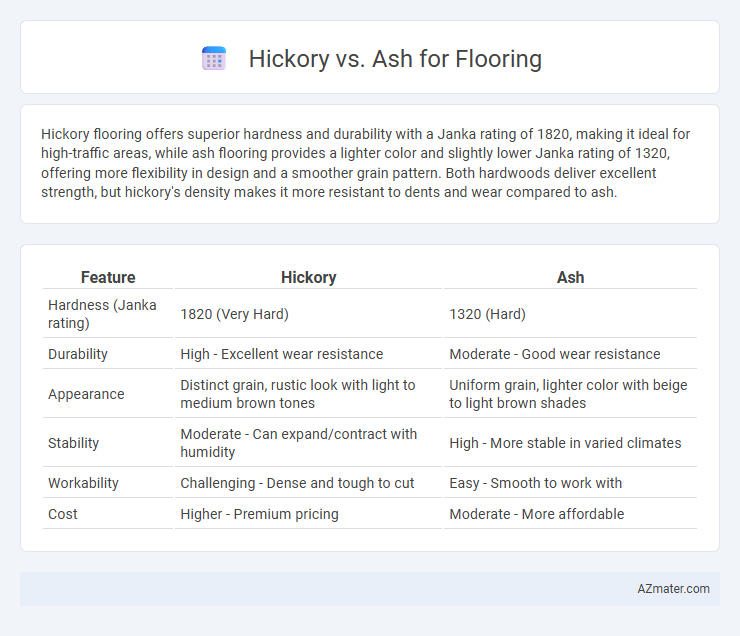Hickory flooring offers superior hardness and durability with a Janka rating of 1820, making it ideal for high-traffic areas, while ash flooring provides a lighter color and slightly lower Janka rating of 1320, offering more flexibility in design and a smoother grain pattern. Both hardwoods deliver excellent strength, but hickory's density makes it more resistant to dents and wear compared to ash.
Table of Comparison
| Feature | Hickory | Ash |
|---|---|---|
| Hardness (Janka rating) | 1820 (Very Hard) | 1320 (Hard) |
| Durability | High - Excellent wear resistance | Moderate - Good wear resistance |
| Appearance | Distinct grain, rustic look with light to medium brown tones | Uniform grain, lighter color with beige to light brown shades |
| Stability | Moderate - Can expand/contract with humidity | High - More stable in varied climates |
| Workability | Challenging - Dense and tough to cut | Easy - Smooth to work with |
| Cost | Higher - Premium pricing | Moderate - More affordable |
Introduction to Hickory and Ash Flooring
Hickory flooring features dense, hard wood with a distinctive grain pattern and rich color variations, making it highly durable and ideal for high-traffic areas. Ash flooring offers a lighter color with a smooth, consistent grain, providing a modern yet natural aesthetic combined with strong resilience and stability. Both hickory and ash are popular hardwood choices known for their hardness, shock resistance, and long-lasting performance in residential and commercial flooring.
Key Differences Between Hickory and Ash Wood
Hickory wood is denser and harder than ash, making it more resistant to dents and wear, which is ideal for high-traffic flooring areas. Ash features a lighter color with a more consistent grain pattern, providing a sleek and uniform appearance perfect for modern interior designs. Both woods offer excellent durability and natural shock resistance, but hickory's higher hardness rating (about 1820 on the Janka scale) surpasses ash's 1320, influencing longevity and maintenance requirements.
Durability and Hardness Comparison
Hickory floors are renowned for their exceptional durability, boasting a Janka hardness rating of approximately 1,820, making them one of the hardest domestic hardwoods available. Ash wood offers slightly less hardness with a Janka rating around 1,320, which still provides strong resistance to dents and wear but is softer than hickory. Both woods are durable choices for flooring, with hickory better suited for high-traffic areas due to its superior hardness.
Aesthetic Appeal: Color and Grain Patterns
Hickory flooring boasts rich color variations ranging from creamy whites to deep reddish browns, featuring prominent swirling grain patterns that create a rustic, dynamic look. Ash flooring offers a lighter, more uniform beige to light brown palette with straight, even grain patterns that provide a clean, contemporary aesthetic. Both woods enhance hardwood floors with distinctive visual textures, but hickory's bold contrasts suit traditional or rustic interiors while ash's subtle tones complement modern, minimalist designs.
Cost Analysis: Hickory vs Ash Flooring
Hickory flooring generally costs between $4 to $8 per square foot, making it moderately priced with excellent durability and hardness ratings of 1820 on the Janka scale. Ash flooring ranges from $3 to $7 per square foot, offering a slightly more affordable option with a Janka hardness of 1320, providing good resilience but less hardness compared to hickory. When comparing long-term investment, hickory's higher upfront cost is offset by its superior wear resistance, while ash offers budget-friendly pricing with acceptable durability for moderate traffic areas.
Installation: Ease and Considerations
Hickory flooring is denser and harder, making installation more labor-intensive and requiring precise acclimation to prevent expansion and contraction issues. Ash offers a slightly softer texture with greater flexibility, allowing for easier cutting and fitting during installation but still demands careful moisture control. Both hardwoods benefit from moisture barriers and professional-level tools to ensure a smooth, stable floor with long-term durability.
Maintenance and Longevity
Hickory floors offer exceptional durability and resistance to wear, requiring minimal maintenance due to their dense grain structure that hides scratches and dents effectively. Ash floors, while slightly softer than hickory, demand more frequent refinishing and care to prevent surface damage, but they provide a flexible and resilient surface ideal for high-traffic areas. Both woods have a lifespan exceeding 30 years with proper upkeep, but hickory's superior hardness rating of 1820 Janka compared to ash's 1320 Janka contributes to longer-lasting performance under heavy use.
Environmental Impact and Sustainability
Hickory and ash both offer distinct environmental impacts and sustainability profiles in flooring applications. Hickory, known for its high density and durability, tends to come from slower-growing trees, leading to a longer regeneration period and potentially higher ecological footprints if not harvested responsibly. Ash, often sourced from faster-growing species with widespread availability, typically provides a more sustainable option, especially when certified by organizations like FSC, due to quicker growth rates and better carbon sequestration during lifecycle.
Best Applications for Hickory and Ash Floors
Hickory floors excel in high-traffic areas due to their exceptional hardness and resistance to dents, making them ideal for entryways, kitchens, and family rooms. Ash flooring offers a softer texture with pronounced grain patterns, suited for living rooms and bedrooms where a warmer, more comfortable feel is desired. Both woods provide durability and unique aesthetics, but choosing Hickory optimizes resilience while Ash prioritizes visual appeal and moderate wear conditions.
Which is Better: Hickory or Ash for Your Floor?
Hickory offers superior hardness and durability with a Janka rating around 1820, making it ideal for high-traffic areas, whereas Ash has a slightly lower hardness at about 1320 but features a lighter, more uniform grain that enhances brightness in room design. Both woods provide excellent shock resistance and wearability, yet Hickory's varied color tones add rustic character, while Ash tends to offer a more consistent and contemporary aesthetic. Choosing between Hickory and Ash for your flooring depends on balancing durability needs with your preferred visual style and maintenance considerations.

Infographic: Hickory vs Ash for Floor
 azmater.com
azmater.com